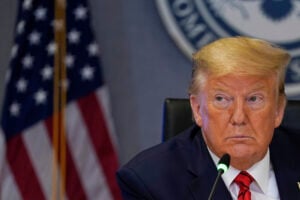[ad_1]

(Photo by Evan Vucci-Pool/Getty Images)
It seems increasingly likely that the former president will soon be indicted somewhere — Florida, for obstructing justice; D.C., for inciting violence; somewhere.
Trump has recently insisted that, if he gets indicted, “I think you’d have problems in this country the likes of which perhaps we’ve never seen before.” That got me to thinking about those problems, and there are three on my mind today: Venue — whether Trump could move the case from Florida or D.C. to a more favorable venue — jury selection, and security.
Venue is the easiest issue. A criminal defendant has the right to a fair trial, which means, in part, a jury of people who haven’t already been influenced by massive publicity about an event. A defendant thus has the right to move a case from an area that has been influenced by massive publicity to another forum that has been less polluted.
In Trump’s situation, that’s impossible. This case involves national publicity, not local publicity. It may be true that a Florida or D.C. jury has been influenced by pretrial publicity, but no venue hasn’t been similarly affected. A judge could transfer the Trump case to anywhere in America, and there still would have been massive pretrial publicity that could influence a local jury. Thus, I suspect that any attempt to change venue will fail.
The second thing I’m thinking about is jury selection. Only a unanimous jury can convict a person of a crime; one holdout results in a hung jury. Thus, if a jury contains a single MAGA Republican — who will never vote to convict Trump for anything, no matter what the evidence shows — then Trump will not be convicted.
It’s true that other influential Republicans close to Trump — I’m thinking of Michael Flynn and Steve Bannon, for example — have been convicted. But there’s a world of difference there. Flynn and Bannon were merely “influential Republicans” — they were not Donald Trump. Folks who would refuse to convict Trump himself under any circumstance might yet vote to convict someone else, if the evidence was strong enough. I don’t think any other situation tells you what would happen if Trump were in the dock.
Lawyers in criminal cases can of course challenge jurors, either for cause or by using a peremptory challenge. But both sides get the same number of challenges. If the pool of jurors is split basically 60-40 between Democrats and MAGA Republicans, it will be very hard for the prosecutors to strike all of the MAGA Republicans from the panel. (The country is divided basically 50-50 between Democrats and Republicans, but not all Republicans are pro-Trump or so pro-Trump that they would never vote to convict. That’s why my hypothetical jury pool is split 60-40 between Democrats and the relevant Republicans.)
Trump is, of course, entitled to have Republicans on the jury panel. They’re part of the population and part of a fair jury. But Trump is not entitled to have anyone on the panel whose mind is made up in advance and who would not vote to convict no matter what the evidence showed. The prosecutors would have to create questions that teased out those people from among those in the jury pool.
That will be hard — in part because people lie during jury selection. In the typical case, a prospective juror simply doesn’t want to be on the jury in a case that will run for several weeks. So the juror says that he or she couldn’t be fair for some reason — something about prior jury service, or the juror’s brother-in-law’s experience, or something else. This attempt to evade jury service often infuriates judges, but they see it all the time.
If a MAGA Republican were itching to get on the jury in the Trump case to exonerate Trump no matter the evidence, that MAGA Republican would simply lie to conceal his or her feelings. It would be very hard for prosecutors to pick a jury of 12 people all of whom would vote to convict if the evidence were sufficient.
Lastly, I’m thinking about security. The security issues for the trial itself would be immense. The courthouse, the judge, the prosecutors, the jurors, and the witnesses would all require protection. The identity of the jurors would presumably be protected and the jurors sequestered (in a hotel) through trial. But identities of people leak, and the name of the hotel might become known. Witnesses — even those witnesses who worked closely with Trump and are among his most fervent supporters — might testify against Trump when confronted with either indisputable documents or the threat of a prison term if they lied. Thus, even pro-Trump witnesses would need protection.
Then I’m thinking more broadly: We saw an FBI office in Cincinnati attacked after the FBI searched Trump’s residence in Mar-a-Lago. FBI agents would presumably be among the witnesses at Trump’s trial. Would FBI offices around the country need protection? Courthouses around the country? The Department of Justice’s offices around the country? Anyone else?
And Trump himself would not help with the security problems. This is a man who allegedly incited an insurrection at the Capitol when he was only at risk of losing the presidency. What might he do if he were at risk of being sent to jail?
If Trump is indicted, the motion to change venue is easy. But the need to pick a fair jury, and the security issues, are much more serious. Perhaps Trump is right that his indictment would cause problems the likes of which we’ve never seen before.
Mark Herrmann spent 17 years as a partner at a leading international law firm and is now deputy general counsel at a large international company. He is the author of The Curmudgeon’s Guide to Practicing Law and Drug and Device Product Liability Litigation Strategy (affiliate links). You can reach him by email at inhouse@abovethelaw.com.
[ad_2]




